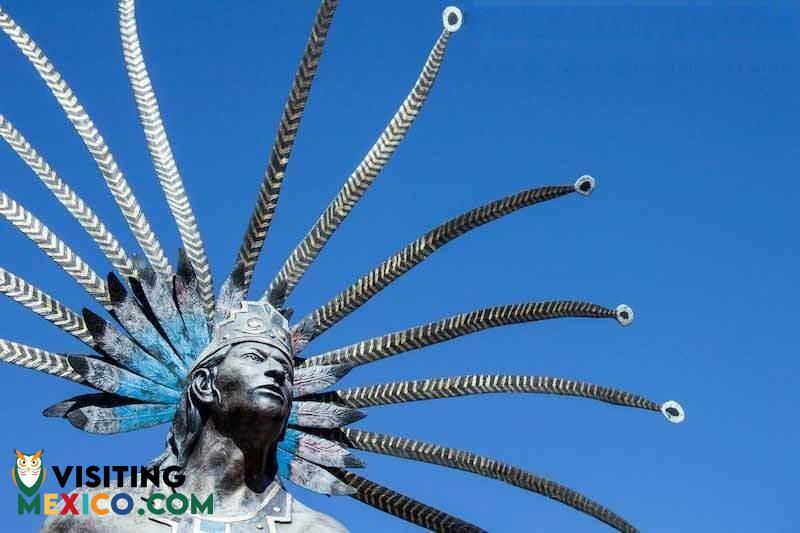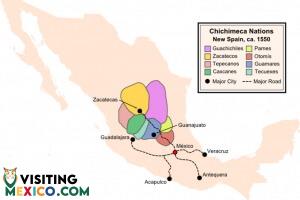Indigenous Peoples of Mexico: The Guachichil Tribe
City in Mexico
As the largest tribe of the Chichimeca nation, the Guachichil retained the largest territory of Chichimeca land. They lived between present-day Saltillo, which constituted their northern border, and the northern reaches of present-day Michoacán in the south. They were known to range through the states of San Luis Potosi, Guanajuato, Zacatecas, and parts of Jalisco. Their biggest claims to fame were their influential stance against the Spanish and the warriors’ practice of painting their bodies red.

Cultural Identity of Guachichil
The Guachichil were part of the larger hunter-gatherer Chichimeca peoples. Known as fierce warriors, the Spanish referred to them as “barbarians.” Their practices, however, were similar to a long line of cultures in northern Mexico. While hunting and gathering foodstuffs like acorns, mesquite and agave were the norms, some farming was practiced in various areas where maize could be cultivated. Chichimeca groups like the Guachichil also made bread and a type of wine from mesquite. Due to their nomadic life, the tribe lived in crude, makeshift shelters or in caves. Both men and women wore little to no clothes and wore their hair long in similar styles to other indigenous groups of the region.
The Guachichil spoke a Chichimec language, but it is extinct today; scholars believe it may have been a Uto-Aztecan language. Much of the information about the Guachichil comes from the Spanish who were particularly biased against these fierce warriors that put up such immense resistance to Spanish domination. According to Spanish writers who were contemporaries of the Guachichilpeople, the tribe was known for its reliance on the game and the gathering of roots and berries. Their practice of painting themselves red particularly impressed the Spanish who seemed always to mention this fact as a sort of proof of their barbarity. A sixteenth-century Spanish writer also commented on Guachichil women and their practice of giving birth without losing a day of travel—also proof of barbarity, according to the Spanish.

It was reported that the Guachichil did not worship idols, but practiced naturalistic worship of the skies, stars, and other natural phenomena. The Guachichil were the most feared of the Chichimec tribes and their position on the silver route allowed them to continually attack the Spanish who invaded their territory. While little has been written about the Guachichil, they are continually revered for their bravery. Recent interest among historians for the Chichimeca peoples is likely to result in more published information about the Guachichil.
The Fight to Preserve Identity and Way of Life
When the Spanish began to make forays into the north and Chichimeca territory, the Guachichil was instrumental in convincing other tribes to resist. The Spanish believed the tribes would make good miners and enslaved many northern captives to that end. The Guachichil’s knowledge of the rough terrain allowed them to effectively ambush Spanish groups. Revolts such as the Mixton War, initiated by the Caxcanes to avenge the Conquistador Guzman’s torture, murder, and enslavement of thousands, resulted in a Spanish victory in 1542; however, this war was merely the forerunner to the much longer and bloodier Chichimeca War that lasted between 1550 and 1590. The Guachichil were instrumental during the long battle for preservation.
The Chichimeca War became the longest and most expensive conflict the Spanish undertook in Mexico. Many scholars believe that the war was a continuation of the Mixton War. The Chichimeca had been fighting the Spanish all along through the intervening decades. In the end, the Spanish, under the influence of the Dominicans who called the Spanish War against the Chichimecas unjust, were forced to employ tactics to assimilate the Chichimeca people besides battle. The drain on Spanish funds and the ability to conquer the northern indigenous tribes through military measures resulted in a purchased peace.
While the Guachichil and Chichimeca people were ultimately forced and sometimes convinced to adopt Spanish farming lifestyles and assimilate into Spanish culture, many people in Mexico today, particularly in their original territory, still refer to themselves as Chichimecs and revere their cultural traditions through festival and study.


